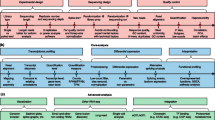Abstract
RNA-Seq is an approach to transcriptome profiling that uses deep-sequencing technologies to detect and accurately quantify RNA molecules originating from a genome at a given moment in time. In recent years, the advent of RNA-Seq has facilitated genome-wide expression profiling, including the identification of novel and rare transcripts like noncoding RNAs and novel alternative splicing isoforms.
Here, we describe the analytical steps required for the identification and characterization of noncoding RNAs starting from RNA-Seq raw samples, with a particular emphasis on long noncoding RNAs (lncRNAs).
Access this chapter
Tax calculation will be finalised at checkout
Purchases are for personal use only
Similar content being viewed by others
References
Cabili MN, Trapnell C, Goff L, Koziol M, Tazon-Vega B, Regev A et al (2011) Integrative annotation of human large intergenic noncoding RNAs reveals global properties and specific subclasses. Genes Dev 25:1915–1927
Iyer MK, Niknafs YS, Malik R, Singhal U, Sahu A, Hosono Y et al (2015) The landscape of long noncoding RNAs in the human transcriptome. Nat Genet 47(3):199–208
Ranzani V, Rossetti G, Panzeri I, Arrigoni A, Bonnal RJ, Curti S et al (2015) The long intergenic noncoding RNA landscape of human lymphocytes highlights the regulation of T cell differentiation by linc-MAF-4. Nat Immunol 16:318–325
Pagani M, Rossetti G, Panzeri I, Candia P, Bonnal RJ, Rossi RL et al (2013) Role of microRNAs and long non coding RNAs in CD4(+) T cell differentiation. Immunol Rev 253:82–96
Rinn JL, Chang HY (2012) Genome regulation by long noncoding RNAs. Annu Rev Biochem 81:145–166
Bentwich I, Avniel A, Karov Y, Aharonov R, Gilad S, Barad O et al (2005) Identification of hundreds of conserved and nonconserved human microRNAs. Nat Genet 37:766–770
Diederichs S (2014) The four dimensions of noncoding RNA conservation. Trends Genet 30:121–123
Trapnell C, Hendrickson DG, Sauvageau M, Goff L, Rinn JL, Pachter L (2013) Differential analysis of gene regulation at transcript resolution with RNA-seq. Nat Biotechnol 31:46–53
Guttman M, Garber M, Levin JZ, Donaghey J, Robinson J, Adiconis X et al (2010) Ab initio reconstruction of cell type-specific transcriptomes in mouse reveals the conserved multi-exonic structure of lincRNAs. Nat Biotechnol 28:503–510
Haas BJ, Papanicolaou A, Yassour M, Grabherr M, Blood PD, Bowden J et al (2013) De novo transcript sequence reconstruction from RNA-seq using the Trinity platform for reference generation and analysis. Nat Protoc 8:1494–1512
Xie Y, Wu G, Tang J, Luo R, Patterson J, Liu S et al (2014) SOAPdenovo-Trans: de novo transcriptome assembly with short RNA-Seq reads. Bioinformatics 30:1660–1666
Schulz MH, Zerbino DR, Vingron M, Birney E (2012) Oases: robust de novo RNA-seq assembly across the dynamic range of expression levels. Bioinformatics 28:1086–1092
Lin MF, Jungreis I, Kellis M (2011) PhyloCSF: a comparative genomics method to distinguish protein coding and non-coding regions. Bioinformatics 27:i275–i282
Sun K, Chen X, Jiang P, Song X, Wang H, Sun H (2013) iSeeRNA: identification of long intergenic non-coding RNA transcripts from transcriptome sequencing data. BMC Genomics 14:S7
Wang L, Park HJ, Dasari S, Wang S, Kocher J, Li W (2013) CPAT: Coding-Potential Assessment Tool using an alignment-free logistic regression model. Nucleic Acids Res 41:e74
Li A, Zhang J, Zhou Z (2014) PLEK: a tool for predicting long non-coding RNAs and messenger RNAs based on an improved k-mer scheme. BMC Bioinform 15:311
Barski A, Cuddapah S, Cui K, Roh T, Schones DE, Wang Z et al (2007) High-resolution profiling of histone methylations in the human genome. Cell 129:823–837
Martin M (2011) Cutadapt removes adapter sequences from high-throughput sequencing reads. EMBnet J 17:10–12
Bolger AM, Lohse M, Usadel B (2014) Trimmomatic: a flexible trimmer for Illumina sequence data. Bioinformatics 30(15):2114–2120, btu170
Dobin A, Davis CA, Schlesinger F, Drenkow J, Zaleski C, Jha S et al (2013) STAR: ultrafast universal RNA-seq aligner. Bioinformatics 29:15–21
Anders S, Pyl PT, Huber W (2014) HTSeq–A Python framework to work with high-throughput sequencing data. Bioinformatics 31(2):166–169, btu638
Love MI, Huber W, Anders S (2014) Moderated estimation of fold change and dispersion for RNA-seq data with DESeq2. Genome Biol 15:550
Bateman A, Coin L, Durbin R, Finn RD, Hollich V, Griffiths‐Jones S et al (2004) The Pfam protein families database. Nucleic Acids Res 32:D138–D141
Trapnell C, Williams BA, Pertea G, Mortazavi A, Kwan G, Van Baren MJ et al (2010) Transcript assembly and quantification by RNA-Seq reveals unannotated transcripts and isoform switching during cell differentiation. Nat Biotechnol 28:511–515
Anders S, Huber W (2010) Differential expression analysis for sequence count data. Genome Biol 11:R106
Mattick JS, Rinn JL (2015) Discovery and annotation of long noncoding RNAs. Nat Struct Mol Biol 22:5–7
Author information
Authors and Affiliations
Corresponding authors
Editor information
Editors and Affiliations
Rights and permissions
Copyright information
© 2016 Springer Science+Business Media New York
About this protocol
Cite this protocol
Arrigoni, A. et al. (2016). Analysis RNA-seq and Noncoding RNA. In: Lanzuolo, C., Bodega, B. (eds) Polycomb Group Proteins. Methods in Molecular Biology, vol 1480. Humana Press, New York, NY. https://doi.org/10.1007/978-1-4939-6380-5_11
Download citation
DOI: https://doi.org/10.1007/978-1-4939-6380-5_11
Published:
Publisher Name: Humana Press, New York, NY
Print ISBN: 978-1-4939-6378-2
Online ISBN: 978-1-4939-6380-5
eBook Packages: Springer Protocols




